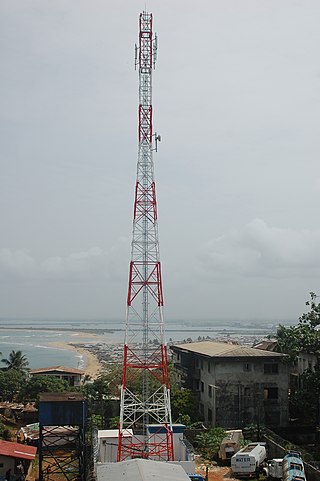Telecommunications in Burkina Faso include radio, television, fixed and mobile telephones, and the Internet.
Telecommunications in the Dominican Republic include radio, television, fixed and mobile telephones, and the Internet.
Telecommunications in Haiti Internet, radio, television, fixed and mobile telephones.
Telecommunication in Honduras started in 1876 when the first telegraph was introduced, continued development with the telephone in 1891, radio in 1928, television in 1959, the Internet in the early 1990s, and cellphones in 1996.

Mass media in Liberia include the press, radio, television, fixed and mobile telephones, and the Internet.
Telecommunications in Mozambique include radio, television, fixed and mobile telephones, and the Internet.
Telecommunications in Nicaragua include radio, television, fixed and mobile telephones, and the Internet.
Telecommunications in Niger include radio, television, fixed and mobile telephones, and the Internet.
Telecommunications in Peru include radio and television, fixed and mobile telephones, and the Internet.
Communications in Madagascar include newspapers, radio, television, fixed and mobile telephones, and the Internet.
ONO was a Spanish broadband communication and entertainment company, delivering integrated telephone, television and Internet services to its residential customers. In this segment, it has 3.7 million services contracted and over six million users.
Telecommunications in Panama includes radio, television, fixed and mobile telephones, and the Internet.
The Internet in Croatia became a reality in November 1992 when the first international connection linking Zagreb and Vienna became operational.
This article is about the Internet in Spain.
Although in 2011 only about 9.0% percent of Nepal's population used the Internet, use of the Internet in Nepal is growing rapidly. As of July 2021, 90.56% of the population has access to the Internet according to Nepal Telecommunications Authority (NTA).
Telecommunications in Costa Rica include radio, television, fixed and mobile telephones, and the Internet.
The mass media in Gabon is primarily monitored by the Gabon government. Although the main newspapers are associated with the government, there are private broadcasters, and private weekly newspapers that are mostly controlled by opposition parties.

Europa Press is a Spanish news agency founded in 1953. It broadcasts news 24 hours a day, publishing 3,000 articles on average per day. Originally founded as a book distribution company by five monarchists, Europa Press became a news agency in 1966. It became a competitor to the State-run Agencia EFE.
The mass media in Mauritania is undergoing a shift into a freer journalistic environment, while becoming increasingly open to private sector.
The following is a timeline of the history of the city of Cartagena, Spain.


